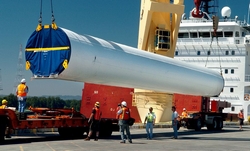forum
library
tutorial
contact

Prepare to Compete
by Editorial BoardThe Columbian, February 6, 2009
|
the film forum library tutorial contact |

|
Prepare to Compete
by Editorial BoardThe Columbian, February 6, 2009 |
State and local efforts show promise as the 'green jobs' industry evolves
 Gov. Chris Gregoire often explains that, in addition to dealing with the current economic slump, we face another tough challenge. It's positioning the state in such a way that, when the expected recovery begins, Washingtonians will be poised for success.
Gov. Chris Gregoire often explains that, in addition to dealing with the current economic slump, we face another tough challenge. It's positioning the state in such a way that, when the expected recovery begins, Washingtonians will be poised for success.
More than just struggling to survive economically, Washingtonians also are preparing. When those glorious, prosperous days finally arrive, the best way to compete against other states will not be simply finding new ways of doing old things. It will be developing a broad base of cutting-edge jobs, and that effort begins now. Nurturing "green jobs" now ultimately will put our state far ahead of other states.
The governor and the Legislature are working feverishly to encourage green jobs, a field that includes four basic groups: improving energy efficiency; expanding renewable energy production; preventing and reducing pollution; and mitigating or cleaning up pollution. Fortunately, that second group -- generating power in sustainable ways -- is having a large impact in our community, specifically at the Port of Vancouver.
"The wind-energy industry in the state of Washington has moved from virtually nothing in 2001 to now ranking fifth in the United States in installed generating capacity," said Tony Usibelli of the state Office of Trade and Economic Development, in a recent telephone interview with The Columbian. "That installed capacity is 1,600 megawatts of power, and what's happening at the Port of Vancouver is a perfect example of how this happens."
In recent years the local port has become a primary destination for wind-turbine components that are barged up the Columbia River to wind farms in central and eastern Washington and Oregon. Thursday brought two key developments in that part of the local economy. Port Executive Director Larry Paulson announced that two wind-energy agreements were secured recently. A three-year extension of an existing contract with Vestas Wind Systems was signed, along with a two-year contract with Siemens Energy. In both cases, the Port of Vancouver will serve as the exclusive Columbia River shipping point. The two deals could provide 235 jobs and $20 million in extended economic value annually.
Many of us are familiar with the huge blades, hubs, tower extensions and other components that are trucked from the port to the wind farms. It's great to see that those activities will continue, and it's more than just the trucking activities that we see. Longshoremen offload parts with a 140-metric-ton mobile harbor crane, construction workers build holding spaces, and other suppliers participate in the movement of material for a cutting-edge industry. Consider also the wind industry's growth potential. For example, a second massive mobile crane has been ordered and is expected to arrive at the local port next month.
Significant as it is, this is only a part of the green-jobs movement, which also includes building energy-efficient offices and homes, retrofitting low-income residents' homes to maximize efficiency, building solar panels and plants, reducing vehicle emissions and cleaning up polluted areas. In general, we're accelerating the dirty fossil-fuel industry's long-overdue obsolescence.
Is all of this just a pipe dream? Not really. Last year, $16 billion left our state in the archaic effort to import fossil fuels. Imagine what will happen when we modernize and learn how to keep that money here. It's all about positioning ourselves for the future.
learn more on topics covered in the film
see the video
read the script
learn the songs
discussion forum
